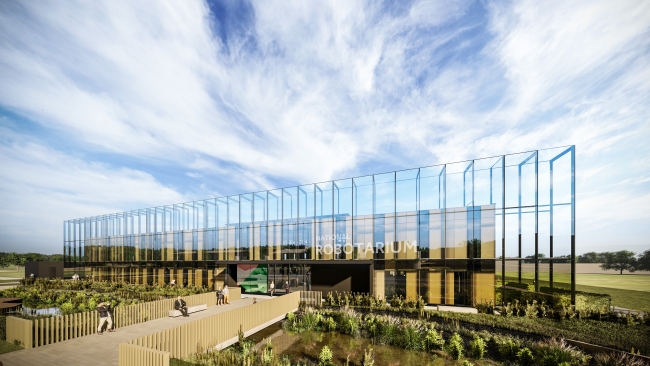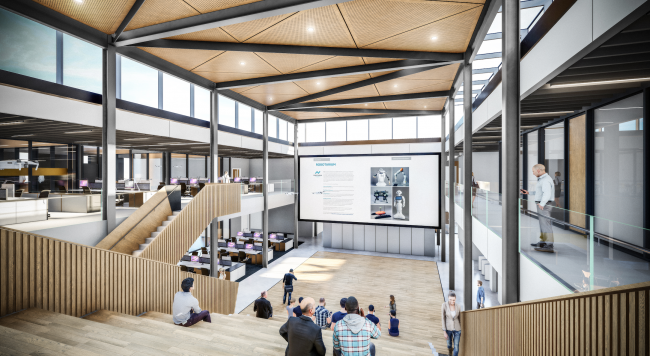3 minute read
Construction begins on £22.4m robotics research centre
Construction has started on a world-leading research facility for robotics and artificial intelligence, which will be the largest and most advanced of its type in the UK.
Based at Heriot-Watt University’s Edinburgh campus, the National Robotarium is supported by £21m of UK government funding, and £1.4m from the Scottish government, as part of the Edinburgh and South East Scotland City Region Deal.
The National Robotarium will be a centre of excellence for pioneering research and is expected to open in spring 2022. It will create innovative solutions to global challenges using cutting-edge research, product design and industry collaboration. Bringing together academics and global companies, the facility will provide a catalyst for entrepreneurship and is expected to deliver sustainable economic benefit to Edinburgh, the UK and beyond.

Construction has started on the £22.4m National Robotarium, a world-leading research facility for robotics and artificial intelligence / Picture: Heriot-Watt University
Although research projects led by the National Robotarium have already begun, the new building will provide extensive world-class facilities for researchers and knowledge exchange. Key areas of research application will include hazardous environments, offshore energy, manufacturing, healthcare, human-robot interaction, assisted living and agritech.
Professor Helen Hastie and Professor Yvan Petillot are joint academic leads of the National Robotarium.
Professor Hastie said: “As a world-leading facility that will promote entrepreneurship and drive forward early-stage product development, the National Robotarium will play a significant role in supporting the UK’s economic recovery from the Covid-19 pandemic.
“By drawing upon the world-class talent of the staff at Heriot-Watt and our collaborative partner, the University of Edinburgh, alongside students at the Centre for Doctoral Training in Robotics and Autonomous Systems, the National Robotarium will form a centre of excellence for fundamental research and knowledge exchange to address real-world challenges and industry needs.
“The new building will facilitate a collaborative approach that is at the heart of the National Robotarium’s ethos, helping to accelerate research from laboratory to market and paving the way for the UK to take a leadership role in AI and robotics technology.”

The facility will include high precision manufacturing capabilities and will specialise in developing robotics in areas including offshore energy, healthcare, assisted living and agritech / Picture: Heriot-Watt University
Professor Yvan Petillot added: “The cutting-edge resources provided by the new facility combined with the expertise of our researchers will put us in a highly competitive position to elevate the UK onto the global stage in robotics and AI technologies. Our existing and new students will have the opportunity to apply their knowledge by working on real-world problems through internships and industry-led group projects facilitated by the Robotarium, accelerating their skills as they actively shape the future of the field.
“We hope to inspire subsequent generations about the positive impact of robotics and artificial intelligence, building trust, ethics and understanding into our research outputs and engaging the public regularly through school visits and open days.”
Funded as part of the Edinburgh and South East Scotland City Region Deal, the National Robotarium is a collaboration between Heriot-Watt University and the University of Edinburgh. The 40,000ft² building will house three distinct research and development areas, providing bespoke facilities for Robotics & Autonomous Systems (RAS), Human & Robotics Interaction (HRI) and High Precision Manufacturing. Amongst the specialist equipment will be dedicated laser labs, an autonomous systems laboratory, and a living lab for trialling technology in a realistic home setting.
Examples of research projects include SPRING (Socially Pertinent Robots in Gerontological Healthcare), developing the world’s first multi-user conversational robot for healthcare, intended to support the care of elderly patients and the EPSRC ORCA Hub (Offshore Robotics for Certification of Assets), a national hub of five universities led by Heriot-Watt that is advancing technologies to remove humans from hazardous work environments. The building’s assisted living lab will utilise technology to help individuals live independently for longer, with research ranging from robotics and conversational assistants to IoT devices and wireless monitoring techniques.